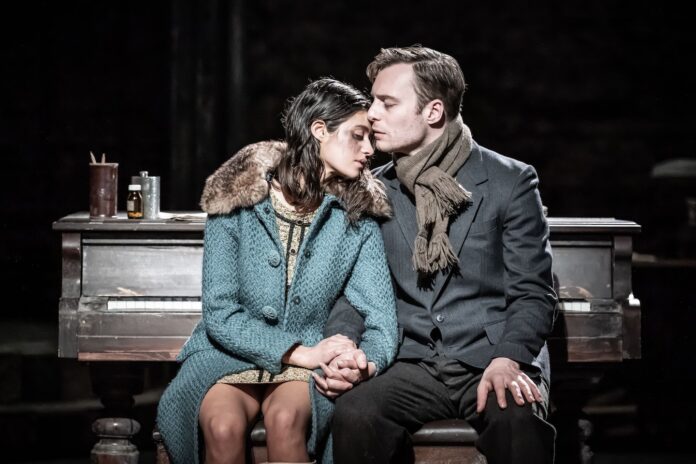Under the direction of Rupert Goold, and with a book by Conor McPherson, the work that has evolved is the latest excursion by a star of popular music into the world of show tunes, and one that justifiably earns the adjective “distinctive.” For “Cold War” is a fascinating hybrid, constructed not only out of new melodies by Costello, but also out of extant Costello songs, as well as from the traditional Polish folk music that figures in the plot.
“I think it’s important to remember that the music is in a balance,” Costello said, in an interview. “It’s a play, supported by music, and music is within the story. But it’s not a musical. So the music really is no more important than any other components — on the whole as essential, I suppose, as lighting or costumes.”
Despite Costello’s insistence, “Cold War” — now playing at London’s Almeida Theatre, with Anya Chalotra and Luke Thallon as the Polish country girl with a singular talent and the choral director who falls in love with her — is a musical. It’s just not a musical that came together in anything like a traditional way. Which is in keeping with a theatrical form that is mindful of convention, but also always looking to remake itself.
“So it’s a mixture of Polish music from the film, Polish music not from the film, including new music that was rediscovered and remade by a modern Polish rock-folk group,” Goold said, sitting in Almeida’s offices in Islington. “Then there are songs that Elvis wrote in response to the movie. And then there is a little bit of Elvis’s back catalogue, and then a little bit that he wrote for the show.”
Given the eclectic inspirations in the 69-year-old musician’s own career, “Cold War” feels like exactly the sort of musical in which Costello would participate. Whether it enters the entertainment mainstream remains to be seen. The London reviews have been admiring, if measured: In Time Out’s London edition, Andrzej Lukowski, who gave it 4 out of 5 stars, wrote that it was funnier and longer than the movie, “with a gorgeously weary nocturnal quality replacing the crisp black and white cinematography.”
The interest of recording artists in repurposing their music for the theater continues on both sides of the Atlantic. Alicia Keys recently debuted her autobiographical musical, “Hell’s Kitchen,” at off-Broadway’s Public Theater, with a transfer to Broadway confirmed for the spring. And at Arena Stage in Washington, the Avett Brothers have boosted their theater fortunes with a well-received mounting of “Swept Away,” starring John Gallagher Jr. and Stark Sands, with music from the group’s rich songbook.
None of these conforms strictly to the genre of jukebox musical, which more often hangs flimsy showbiz stories on the catalogues of rock and folk groups and singers. The added depth to an adaptation of “Cold War” seemed predestined with the sign-on by Goold, a noted British director who runs the Almeida, and McPherson, a playwright who adapted Bob Dylan’s music for the successful Broadway musical “Girl From the North Country.”
“This whole show is partly due to the spark of Elvis, connecting with the movie and contacting the filmmakers to talk about it,” said McPherson. “And you know, you realize that Elvis in the last couple of decades has been writing songs which are very much in the very traditional, old-fashioned songwriting tradition, I think going back to the Gershwins and Cole Porter, which not many pop stars do.”
Once McPherson understood that, he realized how the melodic threads of the story could make sense. “I was like, ‘Oh, I see. Okay, so we can have the Polish folk music, and then as they move into the Jazz Era, and they moved to Paris, Elvis’s songs can definitely flower.’”
With Pawlikowski’s blessing, the stage adaptation closely follows the plot of the movie, which was nominated for three Academy Awards, including best director and best foreign-language film. It charts the meeting of Chalotra’s Zula and Thallon’s Wiktor in post-World War II Poland, as he auditions singers for a chorus founded to highlight Indigenous Polish music and the socialist government’s propaganda. The story, which follows the couple to the West, is a microcosm of the tragedy of a Poland wallowing in hardship and paranoia.
For Costello, being a cog in a theatrical production has been invigorating. “It’s a lovely experience,” he said, and far different from the kinds of performances he’s assembled up to now. “I did recently do a 10-night stand in New York, and I did a different set every night, because I wanted each night to have a distinct mood. So I don’t have much theatrical experience, but because I do that night to night, that is a kind of drama.”
And to find that something he wrote years ago might illuminate drama in a new fashion — particularly in such a collaborative project — is itself exciting.
“It doesn’t really alarm me in any way, even if a song disappears from a scene,” he said. “Because, as I say, the important thing is the whole, and the cohesion of the story.”
Cold War, music by Elvis Costello, book by Conor McPherson, based on the film by Pawel Pawlikowski. Directed by Rupert Goold. Through Jan. 27 at Almeida Theatre, London. almeida.co.uk.



